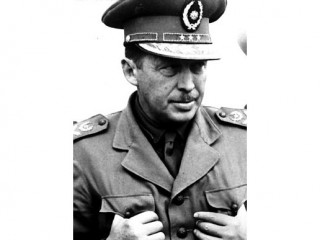
Alfredo Stroessner biography
Date of birth : 1912-11-03
Date of death : 2006-08-16
Birthplace : Encarnación, Paraguay
Nationality : Paraguayan
Category : Politics
Last modified : 2010-11-21
Credited as : Politician, dictator, former President of Paraguay
Alfredo Stroessner became president of Paraguay in 1954, and ruled as a dictator until he was overthrown and forced into exile in 1989.
Alfredo Stroessner was born on Nov. 3, 1912, at the southeastern Paraguayan border city of Encarnacion. His father, Hugo Stroessner, was a German immigrant who became a mechanic and ironworker. His mother, Heriberta Matiauda, was the daughter of a prominent Encarnacion family whose roots stemmed from Paraguay's independence era. His wife, Eligia Mora Delgado, was likewise a descendant of an old Paraguayan family. The Stroessners had two sons and a daughter.
A dedicated professional soldier with an unswerving sense of patriotism, Stroessner began his military career at the outbreak of the Chaco War with Bolivia. First serving at the siege of Paraguay's Boqueron outpost in September 1932 as a military college cadet commanding an infantry platoon, he was subsequently commissioned in the field as a second lieutenant and transferred to the artillery, his favored service branch. As a mortar platoon commander, he served with distinction throughout the remainder of the war and received numerous citations.
Promoted to captain in 1936, Stroessner rose swiftly in rank and became general of division in 1951. Post-Chaco service was highlighted by his participation as a loyal army officer in the major 1947 revolution, in which he was commended for his success in blocking Paraguay's southern borders against rebelling army and navy units.
In 1954, he led the coup d'etat which toppled the government of President Federico Chaves. Formally inaugurated as president in August 1954, he was successively reelected, although he sometimes had little or no opposition. Stroessner's administration was founded on an alliance between the military and the dominant Colorado Party. Certain political parties were allowed to exist, while others were banned.
Part of Stroessner's success not only came from his strong rule over his country, but also because of a relatively solid and stable economy he brought to Paraguay. The country's economy grew at a rate uncommon for Latin American nations at the time.
A confirmed anti-Communist, Stroessner nullified all subversive attempts in Paraguay, supported U.S. inter-American objectives, including participation by a Paraguayan contingent in the Dominican Republic episode, and received both U.S. economic assistance and Peace Corps projects in the 1960s. In 1968, following his third reelection, he formally visited Washington—the second Paraguayan president to have been officially invited to the United States.
Under Stroessner's rule, there was no free press. Newspaper presses and radio transmitters were routinely destroyed by police aligned with the Colorado Party. The Progressive magazine noted three examples: Aldo Zuccolillo, publisher of ABC Color, Paraguay's largest newspaper, was jailed, and his paper shut down for five years. Radio Nanduti was off the air for two years after its transmitter was demolished. Reporter Alejandro Mella Latorre was jailed and tortured for 8 1/2 years.
According to Newsweek, "Party membership [in the Colorado Party] was a prerequisite for getting most jobs in government service, the military, or even in nursing or teaching. Stroessner's tools were violence and fear. Critics of the government disappeared, only to show up again floating face down in the muddy Paraguay River."
After 35 years of rule, Stroessner's empire began to crumble. The U.S. started to pressure his government to reform in the late 1970s and 1980s, after human rights violations came to light. Then the economy, which had been quite strong, began to slow, and inflation soared to 30 percent. Street protests, unthinkable a few years earlier, began appearing in 1986. In 1988, Pope John Paul II toured South America, and called for major reforms in Paraguay. Stroessner became ill, and while recovering from prostate surgery, his former right-hand man, Andres Rodriguez, led a military coup and overthrew Stroessner in February, 1989.
Stroessner was originally placed under house arrest, and later allowed to go into exile in Brazil. In 1996, he was reportedly living in a closely guarded mansion in Brazil, occasionally fishing, and keeping a low profile.
References to Stroessner are in George Pendle, Paraguay (1954;3d ed. 1967); Hubert Herring, A History of Latin America (1955; 3d rev. ed. 1968); and Philip Raine, Paraguay (1956).
















